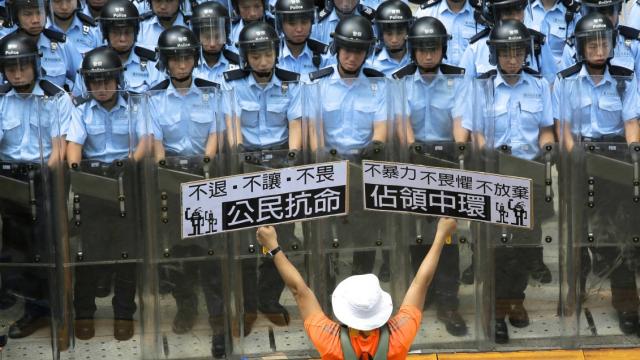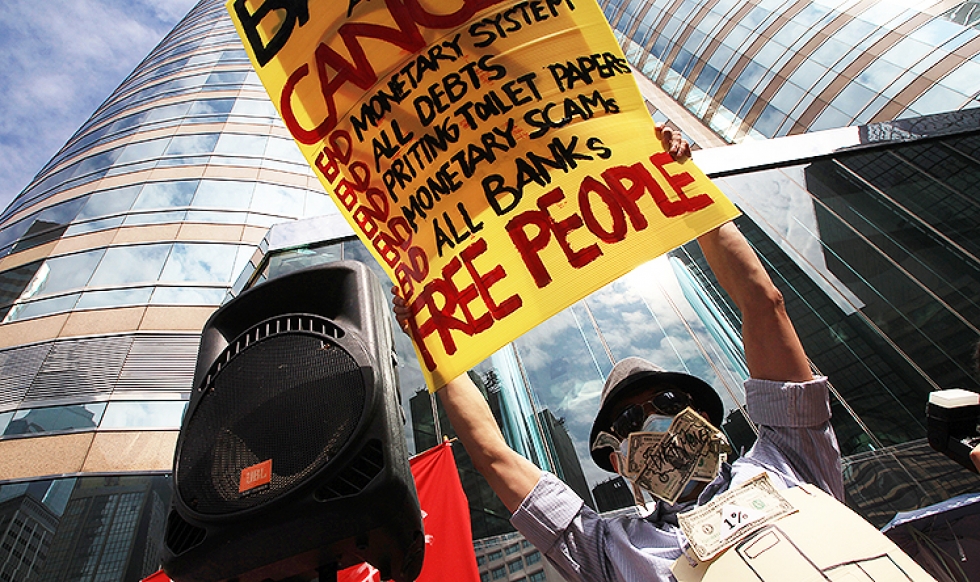
As Hong Kong opened for business Monday, pro-democracy protesters wearing masks and wielding umbrellas to protect against pepper spray and tear gas erected barricades to block security forces and expanded their reach amid chaotic scenes unfolding in one of the world's major financial centers.
Riot police withdrew from the extraordinary scene of clashes that erupted the evening before, and the government asked the student-led protesters to disperse peacefully.
But the protesters — whose use of umbrellas, plastic wrap and other improvised defenses against tear gas has led some to dub their movement the Umbrella Revolution — remained camped on a normally busy highway near Hong Kong government headquarters.
China has called the protests illegal and endorsed the Hong Kong government's crackdown. The protests, which have drawn tens of thousands of people, raised the stakes in the face-off against Chinese President Xi Jinping's administration. Beijing has taken a hard line against threats to the Communist Party's monopoly on power, including clamping down on dissidents.
That did not dissuade protesters.
Protests, which had been focused in the central and Admiralty districts of Hong Kong, expanded on Monday to Wanchai and Causeway Bay and across the harbor to the densely populated Mongkok shopping and business area in Kowloon, where protesters blocked Nathan Road, a main artery.
An officer with a bullhorn attempted to cajole protesters to clear the way for commuters who would soon be streaming into work. A protester, using the group's speaker system, responded by saying that they wanted Hong Kong's Chief Executive Leung Chun-ying and his Cabinet to "do something good for Hong Kong. We want real democracy."
Several Hong Kong financial firms advised staff to work from home or go to secondary offices outside the areas occupied by the protests, and Standard Chartered and Bank of China suspended some of its banking operations because of "situations in certain areas."
Some banks closed branches and ATMs in parts of the city, and Hong Kong's central bank said it stood ready to inject liquidity into the banking system "as and when needed."
Many roads leading to the central business district remained sealed off as thousands of pro-democracy demonstrators defied onslaughts of tear gas and appeals from Hong Kong's top leader to go home before dawn on Monday.
Leung reassured the public that rumors the Chinese army might intervene were untrue.
"I hope the public will keep calm. Don't be misled by the rumors. Police will strive to maintain social order, including ensuring smooth traffic and ensuring the public safety," said the Beijing-backed Leung, who is deeply unpopular. "When they carry out their duties, they will use their maximum discretion."
In the statement broadcast early Monday, he added, "We don't want Hong Kong to be messy."
In a statement issued after midnight, the Hong Kong police said rumors that they used rubber bullets to try to disperse protesters were "totally untrue."
But by the start of the Monday morning commute, more than 200 bus routes had been canceled or diverted in a city dependent on public transport. Some schools near the protest areas were closed. Subway exits have been closed or blocked near protest areas.
The protest movement has been spearheaded largely by college and university-age activists but has gathered momentum among a broad range of people, from high school students to the elderly.
Students and activists have been camped out on the streets outside the city’s main government complex since late Friday. Students started the rally, but by early Sunday leaders of the broader Occupy Central civil disobedience movement said they were joining them to kick-start a long-threatened mass sit-in to demand that an election for Hong Kong's leader be held without Beijing's interference.
China's central government has in recent weeks faced sharp criticism from Western governments over its plans for Hong Kong's electoral reform. Britain said on Monday that it was "concerned" about the mounting protests in Hong Kong and was "monitoring events carefully."
"Hong Kong’s prosperity and security are underpinned by its fundamental rights and freedoms, including the right to demonstrate," the U.K. Foreign Office said. "It is important for Hong Kong to preserve these rights and for Hong Kong people to exercise them within the law."
On Sunday, Hong Kong police fired volleys of tear gas to disperse pro-democracy protests and baton-charged a crowd blocking a key road in the government district in defiance of official warnings that called the demonstrations illegal.
The demonstrations have provoked a rare scene of disorder in the Asian financial hub and highlighted authorities' inability to rein in the public discontent over Beijing's tightening grip on the city.
The protesters reject Beijing's decision last month to rule out open nominations for candidates under proposed guidelines for the first-ever elections for Hong Kong's leader, promised for 2017.
China took control of the former British colony in 1997, agreeing to a policy of "one country, two systems," which allowed Hong Kong to keep civil liberties unseen on the mainland, and promising that the city's leader would eventually be chosen through universal suffrage. But Beijing's insistence on screening election candidates for patriotism has stoked fears among democracy groups that Hong Kong will never have a genuine democracy.
3 WAYS TO SHOW YOUR SUPPORT
- Log in to post comments












